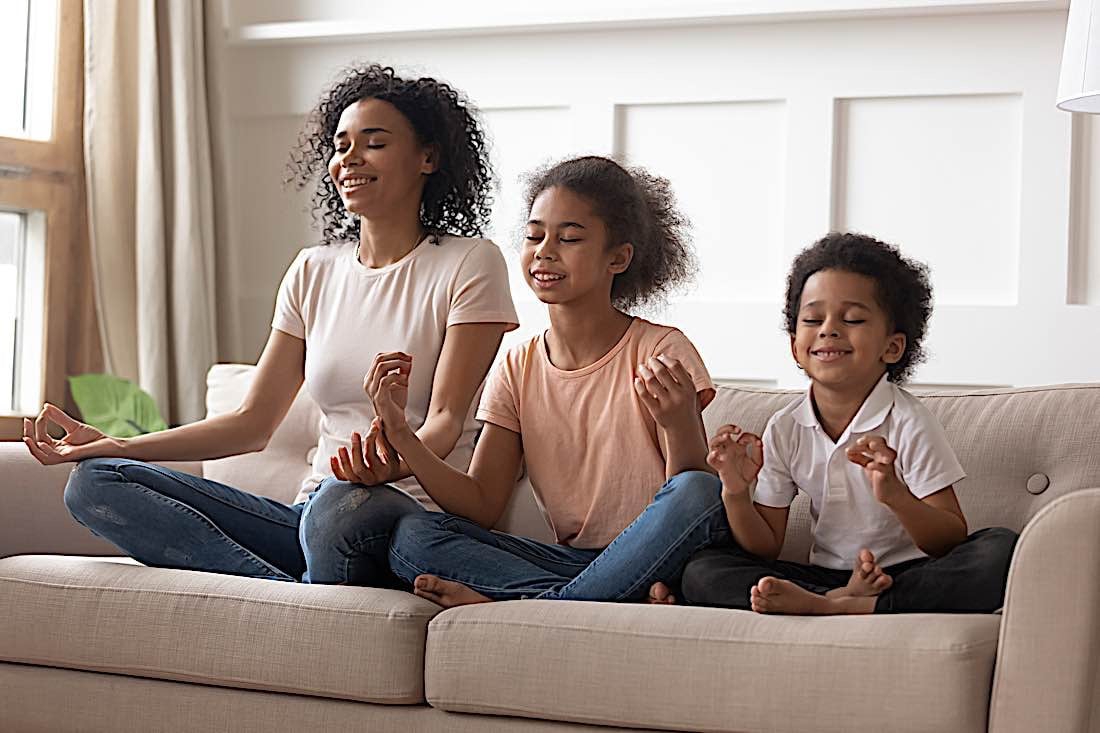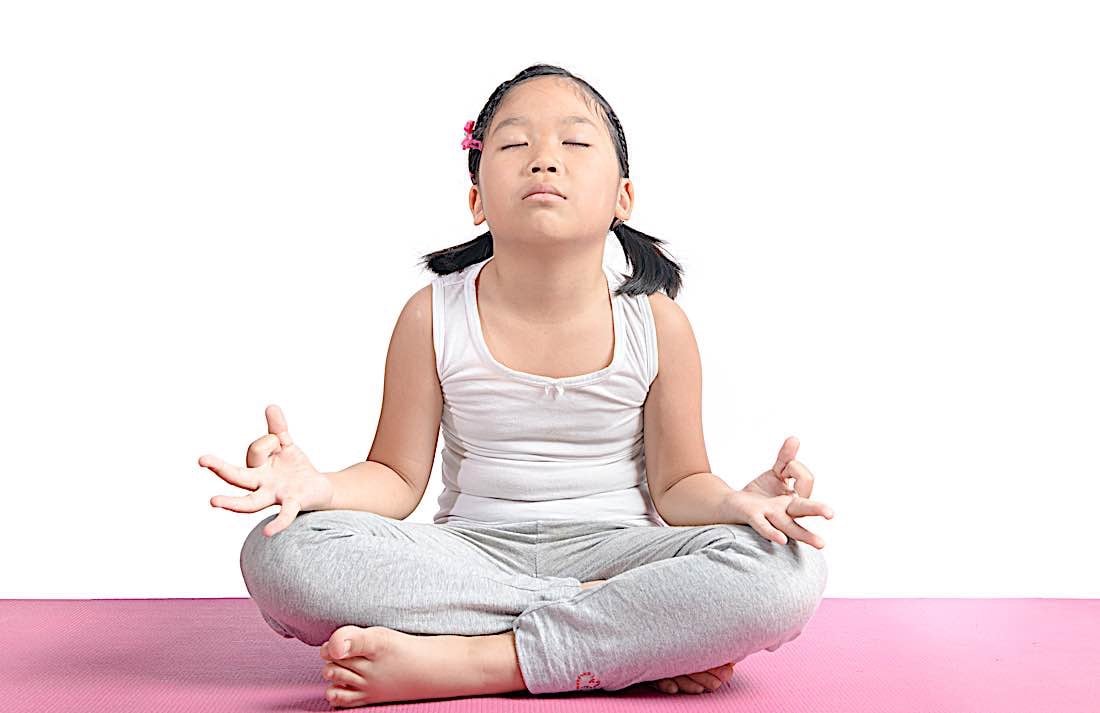Meditation and the Children’s Brains: What Science Says

Mindful parents often introduce their kids to meditative practices at a young age. Some schools have begun replacing detention with meditation and introducing mindfulness into the classroom. [1] What does science say about this ancient practice’s effects on children’s brains?
Various studies have shown that meditation results in physiological changes in the brain. The minds of children are especially malleable — but does this equate to beneficial results? Should meditation play a more integral role in what children learn in youth, and how does it impact their growth and development? Let’s take a closer look.
By Beth Rush
Of Body+Mind Magazine
Disclaimer: Always seek the advice of your health care practitioners when experiencing pain or other medical issues.

Meditation Benefits for Children
Meditation may benefit children greatly and aid their development. Kids are impulsive by nature and learning how to merge their innate curiosity with the world’s limitations can sometimes result in tearful outbursts and conflicts. Those with neurological differences may have an even tougher time fitting in with outside demands, leading to behavioral issues.
Meditation has shown effectiveness even in those with neurological disorders that affect their development. One recent review of multiple studies shows that meditation is an effective intervention for those with ADHD, who often struggle in family and school settings. [2]
Other studies find that meditation also helps children with PTSD, another common mental disorder among school-aged children. [3] Poverty and parental abuse can affect a child’s entire developmental trajectory, but the mindfulness skills learned through meditative practice, while not a substitute for intervention, can mitigate the damage.

Meditation goes beyond helping children thrive despite challenges. It provides all youth with mindfulness tools that can help them actively manage their wellness for life. Meditation has shown multiple benefits [4] that kids carry with them into adulthood, including:
- Less depression and anxiety
- Reduced stress
- Better social interactions
- Lower levels of chronic pain
- Improved self-awareness
Meditation also builds agency in children, helping them attend to their own needs. For example, children who achieve mindfulness through meditation are more aware of signs of physical discomfort. They may notice when the heat makes them uncomfortable, teaching them to choose appropriate clothing and plan outdoor activities for times when the sun is lower. [5] Less mindful kids may risk heat exhaustion by ignoring their body’s cues.
Are There Any Risks to Meditation for Children?
The preponderance of studies show meditation has benefits for children, even when they don’t result in significant mental health changes. [6] The greatest danger may lie in the lack of guidance and awareness in adults who guide such exercises.
For example, sitting quietly in meditation can sometimes give rise to negative thoughts. The risk increases if the child has a trauma history. If the teacher guiding the practice isn’t alert to signs of distress or lacks trauma-informed training to help the child process the emotions that may arise during meditation, the child could grow wary of the practice, seeing it as something painful.
Those who lead children in meditation can improve the benefits by choosing age-appropriate activities that last only a short time and encourage positive mental outcomes. For example, teach children how to calm themselves by practicing various breathing exercises or increase their awareness by listing what they can see, smell, touch, hear and taste. Movement-oriented meditation, such as drumming and yoga, also work well at this age.
A Quick Guide to Using Meditation for Children
Do you want to expand your knowledge of meditation benefits for children and specific techniques for working with this population? Check out these articles for further insight.
- Meditation for Children: Peer-Reviewed Studies Support Structured Meditation in Classrooms and Homes to Help Children Deal With Depression, Negative Coping and Self-Hostility
- Tips for Teaching Children Mindfulness and Meditation — Ideal Practice During Lockdown
- 21 Mother Taras: The Unlimited Forms of Compassionate Activity With Mantras and Visualizations
- Sutras: Seven Benefits of Reading Sutras Daily; and 10 Ways to Learn More and “Deep Dive” Into Buddhist Sutras
Meditation Benefits for Children’s Brains
The preponderance of available research cites considerable benefits of meditation for children’s brains. Teaching this skill earlier in life may aid their mental and emotional development.
Those who teach this practice to kids should employ mindfulness themselves, using age-appropriate techniques and monitoring those who may need extra help. With the right guidance, all can reap the benefits of meditation for children.
References:
[1] “School Proves Meditation Works Better Than Detention.” Sept 2023. Retrieved from>>
[2] Gonzalez, Natalie, et. al. “A Systematic Review of Yoga and Meditation for Attention Deficit/Hyperactivity Disorder in Children.” NIH. March 2023. Retrieved from>>
[3] Laplaud, Nina, et. al. “Management of Post-Traumatic Stress Disorder Symptoms by Yoga: An Overview.” NIH. July 2023. Retrieved from>>
[4] Nolan, Josephine. “Ten Confirmed Health and Wellness Benefits of Meditation: The Science of Mindfulness With 17 Cited Research Studies.” Buddha Weekly. N.d. Buddha Weekly Feature>>
[5] “Staying Safe During California’s Extreme Heat.” Modern Urgent Care. June 2023. Retrieved from>>
[6] Berger, Erika. “Mindfulness May Not Benefit Mental Well-Being in Children and Adolescents.” VeryWell. August 2022. Retrieved from>>
More articles by this author
Search
Latest Features
Please support the "Spread the Dharma" mission as one of our heroic Dharma Supporting Members, or with a one-time donation.
Please Help Support the “Spread the Dharma” Mission!

Be a part of the noble mission as a supporting member or a patron, or a volunteer contributor of content.
The power of Dharma to help sentient beings, in part, lies in ensuring access to Buddha’s precious Dharma — the mission of Buddha Weekly. We can’t do it without you!
A non-profit association since 2007, Buddha Weekly published many feature articles, videos, and, podcasts. Please consider supporting the mission to preserve and “Spread the Dharma." Your support as either a patron or a supporting member helps defray the high costs of producing quality Dharma content. Thank you! Learn more here, or become one of our super karma heroes on Patreon.
Beth Rush
Author | Buddha Weekly
Beth Rush is the Managing Editor and content manager at Body+Mind. She is a well-respected writer in the personal wellness space and shares knowledge on a variety of topics related to nutrition, holistic health, and mental health. You can find Beth on Twitter @bodymindmag.


















